Reviving rustic rhythm
来源:中国日报英文版
2022-07-20 09:01:07
Original Headlines:Reviving rustic rhythm
Source:中国日报英文版
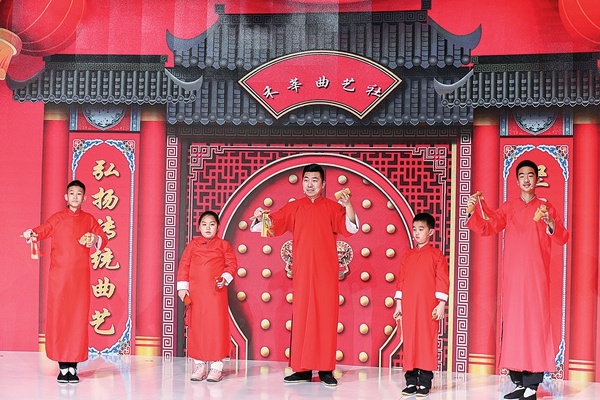
Liu performs clapper talk with youngsters onstage.[Photo provided to China Daily]
A Shandong music teacher is mixing traditional compositions with modern techniques to popularize the folk art of clapper talk among youngsters, Zhang Lei reports.
A classroom packed with chatty first-graders at Quanxin primary school in Jinan, East China's Shandong province, hits pin-drop silence as a teacher walks in. His gown and mandarin-collared jacket project a serious demeanor until he fishes out a pair of clappers from his bag and breaks into a rhythmic caper to accompany his narrative singing. The children beam with joy and burst into peals of laughter.
Meet Liu Yawei, a clapper talk performer who is doing his bit to keep the traditional Chinese percussion instrument made of bamboo from sinking into oblivion. Clapper talk is one type of quyi, a general name of all the Chinese folk art forms of narrating stories in the form of storytelling and singing. Besides clapper talks, there are other types such as ballad singing, storytelling and cross-talk.
Liu, 34, has been showered with many titles, including Shandong province's "upward and kindhearted youth". In the eyes of his friends, he wears many hats: He is a music teacher and a TV host. However, the identity Liu cherishes the most is being the "representative inheritor" of Wang clapper talk, one of the three major schools of the art form.
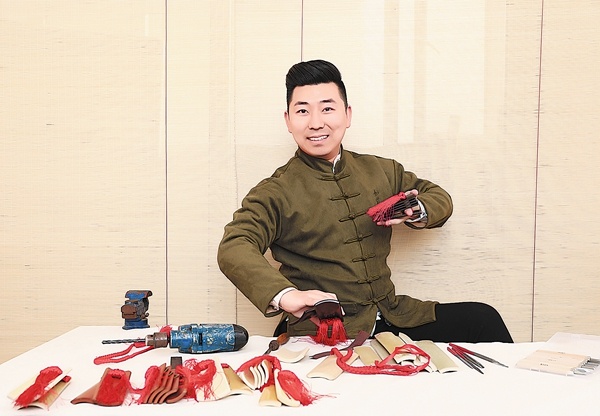
To attract more children to the folk art, Liu Yawei, an inheritor of the Wang school of clapper talk, designs and improves clapper boards.[Photo provided to China Daily]
Persistence and commitment have made him the inheritor of this intangible cultural heritage and the president of Jinan Youth Quyi Alliance, he says.
Liu met Wang Wenxi, known as "the king of clapper talk", during a performance 18 years ago. Wang Wenxi was brought up under the great influence of his father, Wang Fengshan, the partner of the crosstalk master Ma Sanli and the founder of the Wang school of clapper talk.
Wang Wenxi took to the stage at the tender age of 4. Despite being somewhat of a child prodigy, Wang Wenxi's extraordinary cross-talk art and his excellent clapper techniques later in life were in dire need of an inheritor until Liu came along. Wang believed that Liu had the potential to be a good inheritor, because the latter not only revered the folk art, he was also trustworthy and determined.
Liu accepted the role to pass down the heritage, and Wang Wenxi trained him.
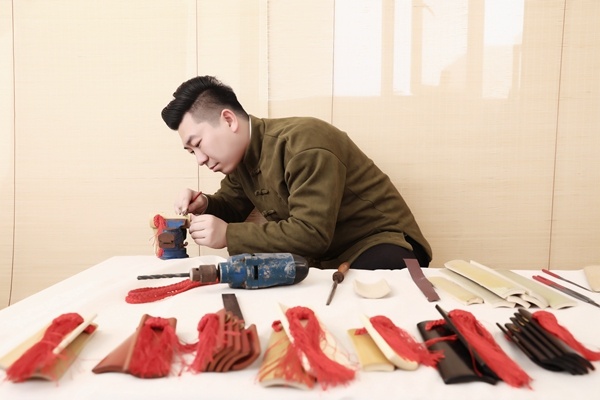
To attract more children to the folk art, Liu Yawei, an inheritor of the Wang school of clapper talk, designs and improves clapper boards.[Photo provided to China Daily]
On the road to excellence, just a hustle in the veins and a dream that won't die were not good enough. To live up to the expectations of his master, Liu always carried a pair of clappers in his pocket, practiced whenever he had time and recited the lyrics while walking down the street.
If ever the thought of giving up crept into his mind, Liu recalled the teachings of Confucius: "Words must be honest and deeds must be faithful."
Improvisation cemented the bond Wang Wenxi and Liu shared. Whenever the master gave a cue, the disciple took the hint and the two played in tacit understanding. The master tilted his head, immersed in his own performance, while Liu bowed slightly beside him, leaned forward to observe and then responded to the change in the master's movement to light up the interaction.
After graduating from university in 2010, Liu became a teacher at a primary school. He convinced the principal to launch a clapper talk group and the Hongyi Club was thus born. Liu insisted on staging a performance every week. The campus quyi club brought out the star quality in the likes of Cheng Siyuan and Wen Xiuhao who won gold at the national children's quyi competition. Five members of the club are now professional clapper talk artists, contributing to China's quintessential folk art.
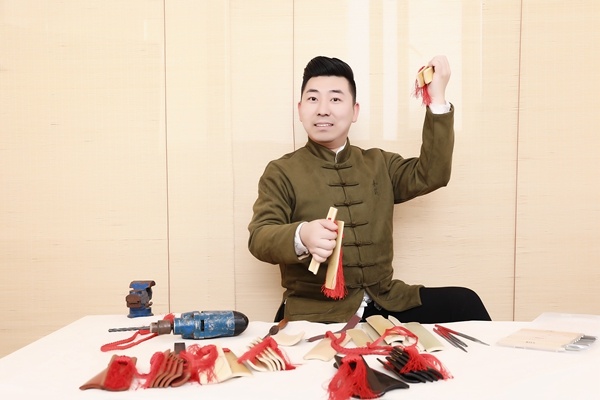
To attract more children to the folk art, Liu Yawei, an inheritor of the Wang school of clapper talk, designs and improves clapper boards.[Photo provided to China Daily]
In 2017, Liu and his master founded a club called Heshen Quyishe, aiming to play their humble roles in Jinan's ambition to become one of the quyi capitals of China. Liu's girlfriend was initially unhappy with his demanding work schedule. However, when she learned that his master Wang Wenxi insisted on performing in public three days a week, even over 70 years old, she understood Liu's perseverance and decided to marry him.
Once clapper talk began to go out of style, Liu realized he needed to find a way to make performances stand out. "I understood a combination of tradition and modernity was the way," he says.
He sought advice from friends in music and literary circles, and finally, created the group clapper talk piece titled Quancheng Wa, Zan Zhonghua (Fountain Town Kids' Ode to China). They won the top prize for best performance at Shandong Campus Art Festival in 2016. Now, the number of performers in their team has increased from the traditional two or three to at least 26 and a maximum of 56. As the percussion instrument and narrative singing echo, they engage the audience like the performance of an opera troupe. Modern compositions and collective lyrics add to the charm.
The novel program became an instant hit and invitations started pouring in from art venues across the country. "The focus should be on cultivating 'more seedlings' for clapper talk," Liu says. "If you want to do a good job in teaching, you must prepare lessons and form a system to dispense those lessons to students."
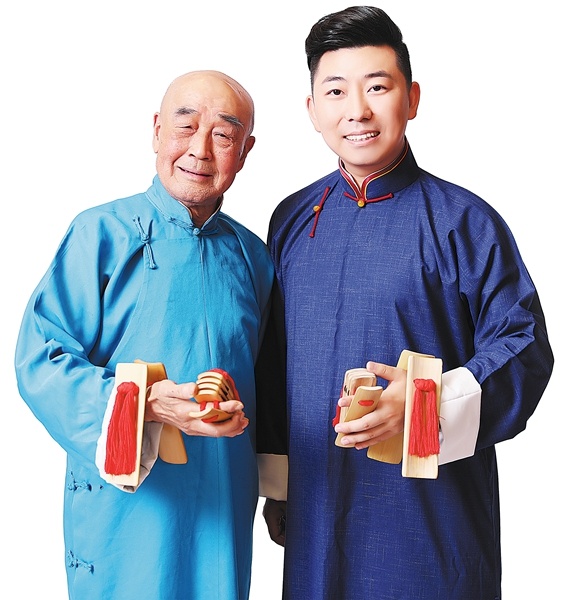
Liu and his master Wang Wenxi keep the clapper-talk tradition alive.[Photo provided to China Daily]
Liu has successively compiled clapper talk textbooks for Zhangzhuang primary school and Quanxin primary school. The tutorials are set to inspire the children. In the process of writing and researching, he found that very few pupils knew about the art; instead, they talked more about online games and animation.
"Clapper talk helps the mind exercise. It can improve the coordination between the brain, the limbs and the mouth. Giving benign stimulation to the cerebral cortex is an effective way to develop the right brain," he says. "As the lyrics follow a tempo, it also develops a child's sense of rhythm."
Liu emphasizes that the folk art pays attention to articulating the words and returning to the sound, using deep breathing, and transporting the air from the belly with vigor. "Besides polishing one's language skills, clapper talk can boost cognitive abilities and motor skills. In short, it is a gem of an art that cannot be lost," he says.
Inspired by a wooden musical instrument, shaped like a toad and producing a unique sound when there was friction between its serrated edges, Liu tried to replicate the rustic music by creating similar serrations on a pair of traditional clappers. He was able to produce a crisp "gadagada" sound.
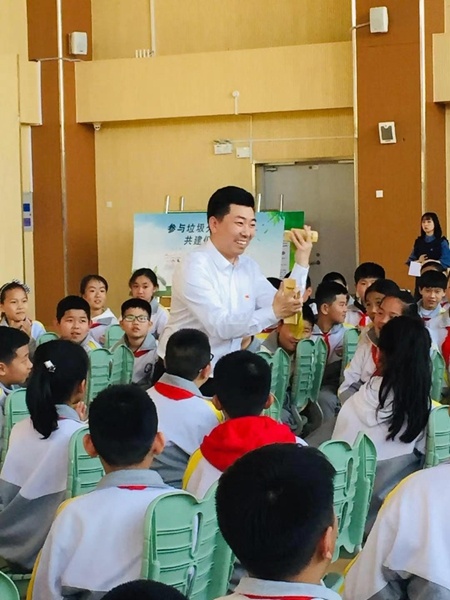
He introduces the art to students in primary schools.[Photo provided to China Daily]
The modification buoyed the enthusiasm of many beginners, and Liu nicknamed the invention "toad board". It obtained a national design patent, and was mass-produced and sold at Shandong culture and art center grand theater and Jinan cultural and tourism bureau's online platform, among others.
To draw more children toward the folk performance, Liu made bold design improvements to the clapper board. The colors and themes included national blue-and-white porcelain, military camouflage and cartoon characters. These earned praise from enthusiasts of traditional culture as well.
With his teaching patterns being recognized by more schools, Liu is focusing on bringing his apprentices to a bigger stage. "What I have learned from my master is not just the skills of clapper talk, but also the virtue of being a dedicated mentor and a good person," he says.
Liu volunteered to teach more than 1,600 students. Now, he is passing down the art to more people through lectures and TV programs, and on social media platforms such as WeChat and Douyin. He interprets virtue through actions, uses integrity and kindness as the themes of his works, and composes a chapter of "the most beautiful youth in the new era".
想爆料?请登录《阳光连线》( http://minsheng.iqilu.com/)、拨打新闻热线0531-66601253,或登录齐鲁网官方微博(@齐鲁网)提供新闻线索。齐鲁网广告热线0531-66601253,诚邀合作伙伴。
Gourd sculptor crafts a new image for market
- Following a design showing on her cellphone, Ruan Xiyue, 35, quickly sketched a manned spacecraft on a gourd, completing the first...[详细]
- 中国日报网英文版 2022-07-20
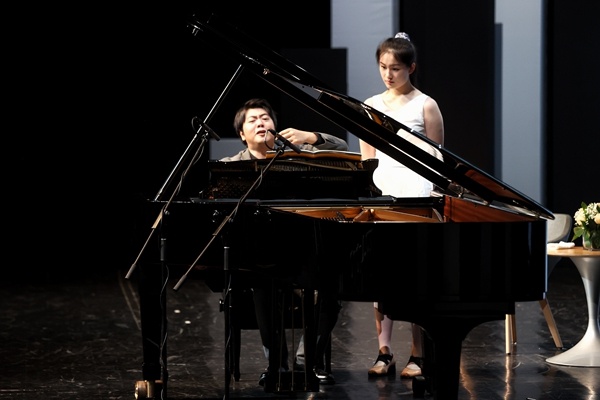
Capital to host master’s class
- Lang Lang plays French composer Maurice Ravel's La Valse, while teaching his student, teenage pianist Wang Keren, during his maste...[详细]
- 中国日报英文版 2022-07-20
Ethnic hamlet an example of revitalized village life
- Dressed in a traditional Chinese Miao ethnic costume, Iraqi student Murtadha Qays Kadhim sits at the loom for the first time and c...[详细]
- 中国日报英文版 2022-07-20

7月23日相约济南!IC中国·车芯泉城圆桌会议即将开幕
- [详细]
- 齐鲁网 2022-07-19
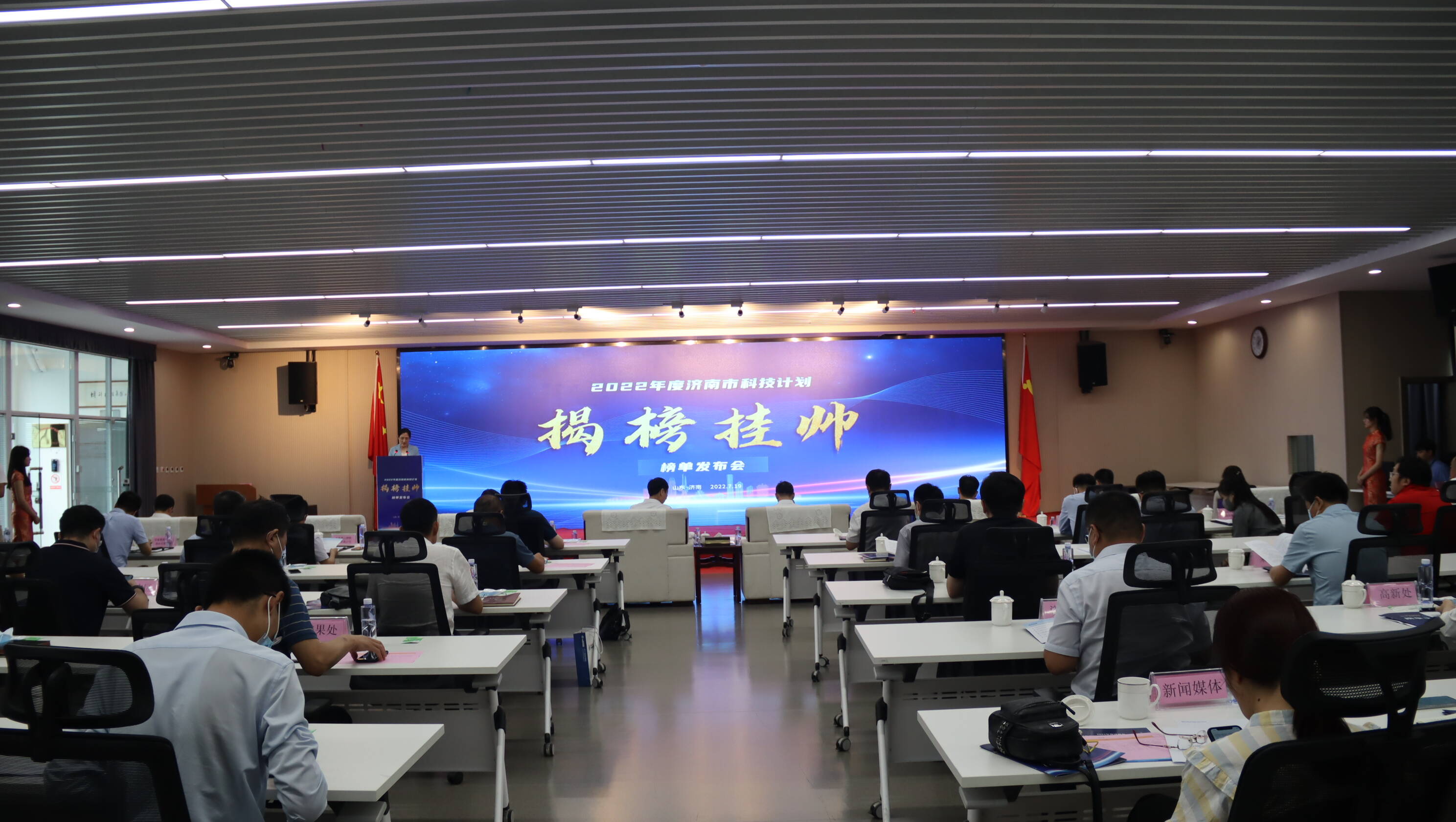
等你来揭榜!济南面向全国发布15项科技计划项目“揭榜挂帅”榜单
- [详细]
- 齐鲁网 2022-07-19

60多位企业家共话不锈钢供应链发展!第三届中国不锈钢供应链企业家峰会在济南召开
- [详细]
- 齐鲁网 2022-07-19

官方辟谣!网传济南普通高中统招分数线,假的!
- [详细]
- 齐鲁网 2022-07-19

第二批国家级夜间文旅消费集聚区名单公示,济南一处入选!
- [详细]
- 齐鲁网 2022-07-19

最新!济南市2022年高中阶段学校招生第二批次志愿录取信息于明天15时公布
- [详细]
- 齐鲁网 2022-07-19

夏日济南槐荫夜经济,热度不止37℃
- [详细]
- 齐鲁网 2022-07-19
济南能源投资控股集团组织开展2022年新员工入职培训
- 7月18日,济南能源集团所属济南能源投资控股集团2022年新员工入职培训拉开序幕,集团公司党委副书记、工会主席王恩立出席开班仪式,2022年...[详细]
- 大众网 2022-07-19
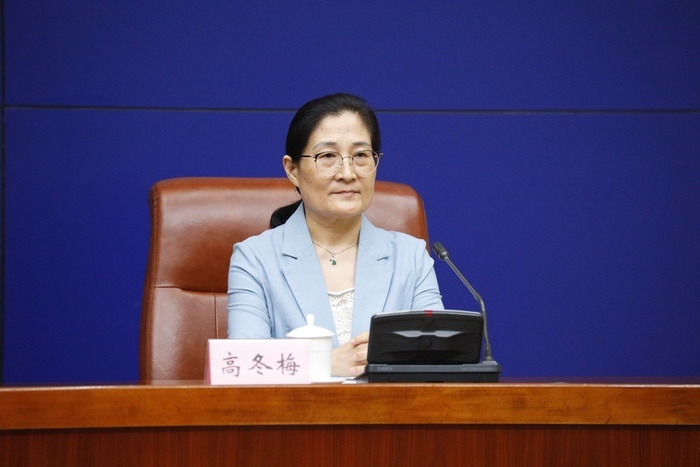
从需求征集到立项实施 济南市科技计划“揭榜挂帅”分四个阶段推进实施
- 7月19日,济南市委市政府召开“2022年度济南市科技计划揭榜挂帅”新闻发布会。济南市科学技术局党组副书记、副局长高冬梅介绍,济南市科技...[详细]
- 大众网 2022-07-19

打好“组合拳”送来“及时雨”!济南起步区298万元助企纾困补贴发放到位
- [详细]
- 齐鲁网 2022-07-19

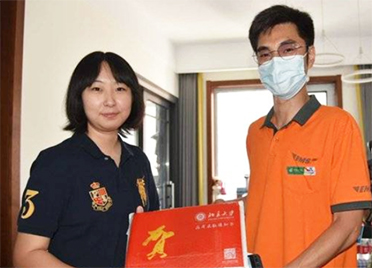
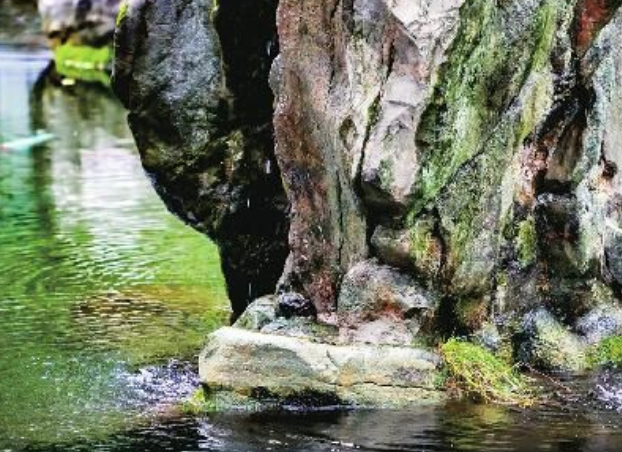


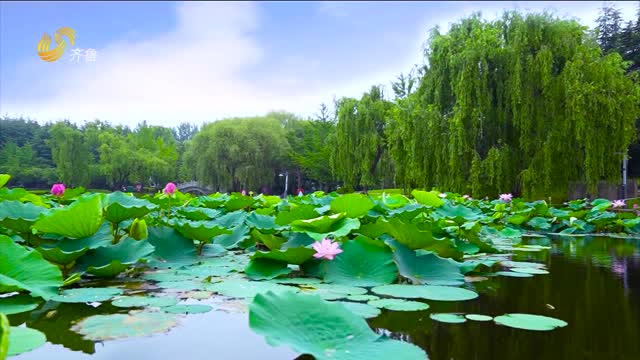


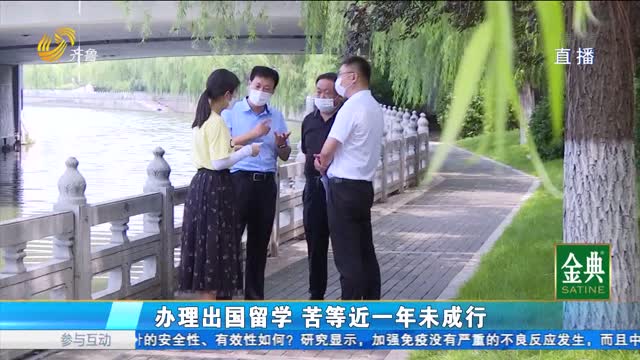



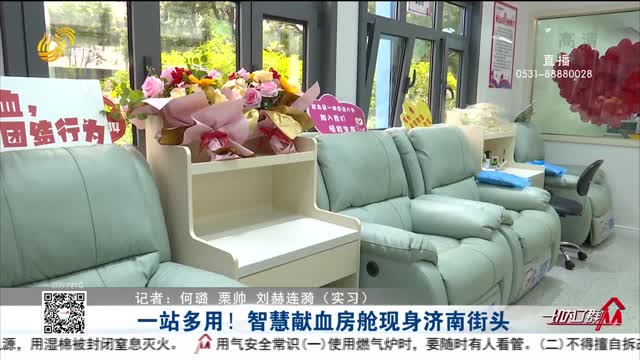
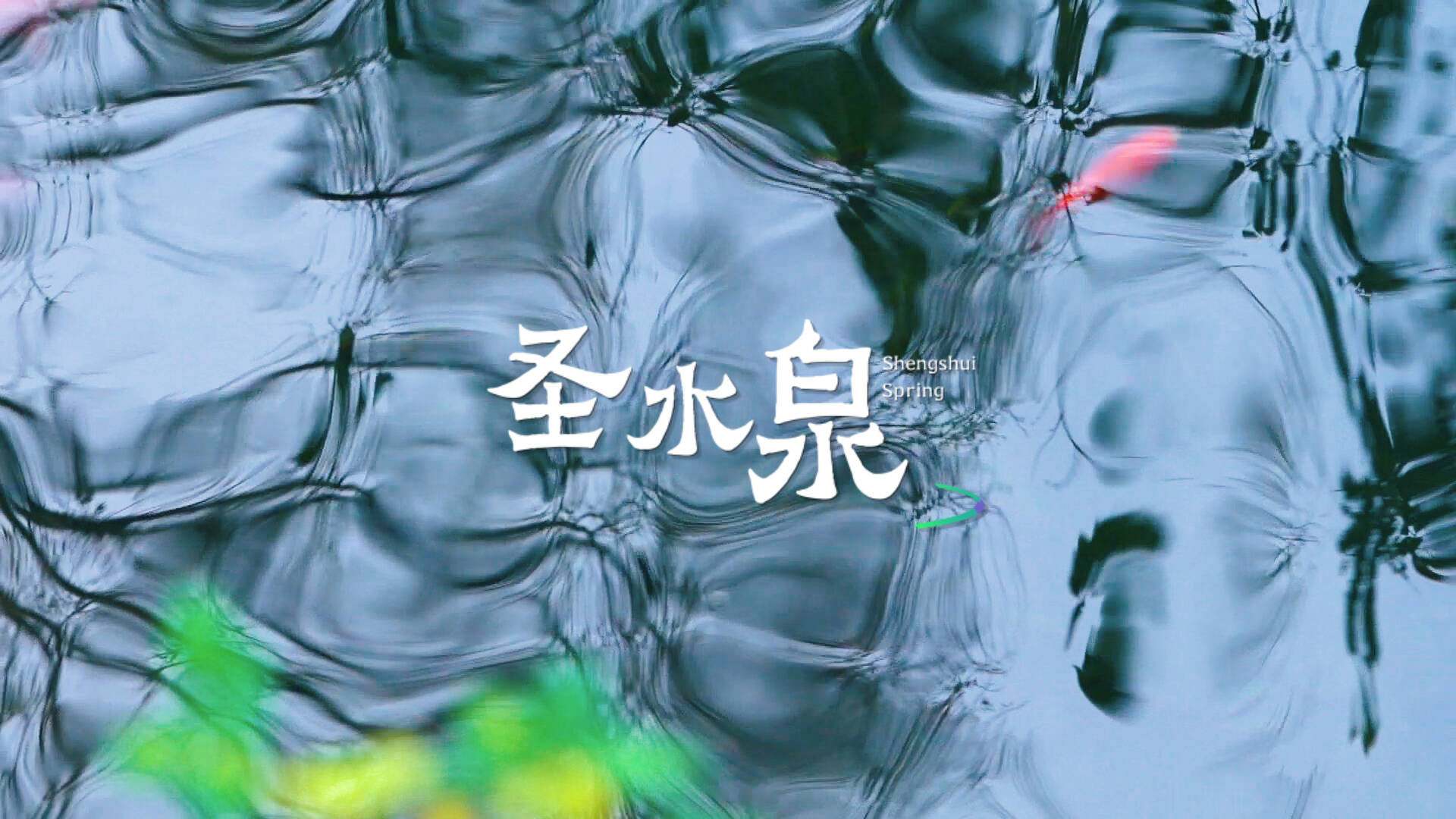


网友评论仅供网友表达个人看法,并不表明齐鲁网同意其观点或证实其描述我来说两句